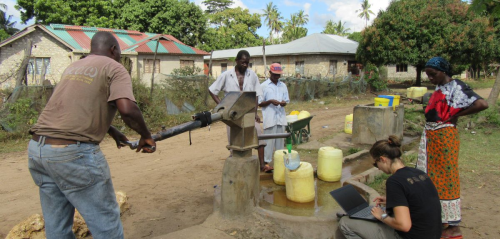
A network of smart hand pumps across the region could provide a way of monitoring groundwater reserves and improve the management and conservation of scarce water resources.
Predicting groundwater depth
Around 1 million hand pumps supply groundwater to around 200 million rural Africans every day. However there is currently too little data to effectively manage this critical source of drinking water. According to researchers from the University of Oxford’s Department of Engineering Science and the School of Geography and the Environment, information about the depth of the groundwater can be obtained by measuring the vibrations produced as the pump handle goes up and down.
Hand pumps emerged as a low-cost, durable technology to supply drinking water to rural communities in the 1980s. The Oxford team started trialling ‘smart' hand pumps in 60 villages in Kenya in 2012. Data transmitters fixed to the handle of the pumps monitor the movement of the handle and provide information on hourly pump use, sending an alert to local repairers in the event of a broken pump. This successfully cut pump repair time from over 1 month to less than 3 days.
In the article Accidental infrastructure for groundwater monitoring in Africa published in the Elsevier journal Environmental Modelling & Software, the researchers now report a new way to interpret the data from the accelerometers fitted to the pump handles. They have found that when the pump is being used to draw water from a deep aquifer, it produces different vibration patterns than when the water level is shallower. The differences in the dynamics of the hand pump were analysed using machine learning techniques, which can pick up subtle patterns in the vibration data to give estimates of the depth of aquifers at the time of drawing up water.
Better management of water resources
The researchers say the study has the potential to be scaled up across Africa, meaning that every time water is pumped data could be harvested from the handle vibrations. Data from a network of hand pumps across the region could be transmitted and stored in the cloud, creating a public dataset that for the first time monitors groundwater reserves across Africa.
"Over four out of five people without access to clean drinking water live in rural areas and rely on groundwater," reports Dr Rob Hope, Associate Professor from the University of Oxford’s School of Geography and the Environment, co-author of the research paper. "This example of 'accidental infrastructure' benefits rural communities by providing critical data that helps meet national and global goals for water security."



